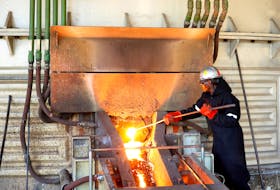SACKVILLE, N.B. – Electrical transformer maker Cam Tran Co. is buying the former Moloney Electric plant in Sackville in a deal set to close next Thursday - and the excitement in Sackville at the prospect of new jobs and renewed economic activity is palpable.
Mayor John Higham, who worked closely with a couple of companies to try to get that plant re-opened, said ahead of the deal closing that he was on pins and needles.
“It’s been a long, hard process with a lot of sharp turns,” he said.
When Moloney Electric shut down, it threw 60 out of work. Mayor Higham’s team stepped in, worked with former Moloney Electric employees and other stakeholders in the community to identify the market for the now-defunct plant’s transformers. Then, they sought out companies to step in to manufacture them in Sackville.
It worked.
Cam Tran’s purchase of the plant’s assets was given the nod in Ontario’s bankruptcy court earlier this month, paving the way for the company to take possession of the property Jan. 25.
“We envisage starting with eight to 10 people and then just knocking on doors (to get more business),” said Cam Tran president Kyle Campbell in an interview.
The deal adds production capacity for Cam Tran, which is already operating at close to full capacity in Colborne, Ont., and has two other plants in each of Spruce Grove, Alta. and Chilliwack, B.C.
The initial work at the Sackville plant will come from contracts now being filled in Ontario, giving the Colborne plant some breathing room.
But, the company’s move into New Brunswick is more about getting close to the Atlantic region’s utilities and drumming up sales than adding production capability.
“Being there, being local, we can supply them 24/7,” said Campbell. “You can’t do that (with a company) from Atlanta. You may be able to get transformers for the same price from Georgia or Tennessee but when they get busy, what place will you have in line?
“We’re right there,” he said. “You might wait 10 to 24 weeks for a transformer from Tennessee, but you can get it shipped out within 24 hours from us if it’s a storm-based situation.”
At its peak, the long-running Moloney Electric employed about 70 people. That all came crashing down on Feb. 26, 2016.
“It was a Friday,” recalls Mike Estabrooks, a former lead hand and Unifor Local 55’s rep at the plant. “They brought everybody together at about 2:30 p.m. … and said, ‘We haven’t got any money to pay you. We’re laying you off.’”
After 22 years with Moloney Electric, Estabrooks was out of a job. He and the other employees were given record of employment papers that indicated they were being laid off for two to three weeks. That was almost two years ago. Estabrooks, now 60 years old, is looking forward to getting back to work. He’s optimistic Cam Tran will provide employment for him and, eventually, for many of the others still out of a job after the plant’s closure.
Wages in the company’s plants range from about $17 to $24 per hour and Cam Tran employees share 23 per cent of the profits every month, said Campbell.
There are those who won’t be coming back to work at the plant, including some who have found other employment.
Peter Ward, now the manager of the local CarStar Express auto repair shop, worked for decades at the Moloney Electric plant. He left before it shut down.
“I saw the writing on the wall,” he said. “We couldn’t get materials. All our vendors shut us down.”
He’s pleased to see at least some of the jobs come back. And he’s hoping those jobs will translate into more business at CarStar Express.
“It keeps workers in town,” he said. “Sackville took a big hit when Moloney Electric closed.”
Russel Metals, which has an outlet just down the road from the still-closed plant, used to supply it and is among those Sackville companies likely to benefit from the arrival of Cam Tran.
Marion Britton, Russel Metals’ executive vice president and chief financial officer, said the North American metal products company is now hoping to be able to once again supply the plant.
After all, there’s already an established business relationship between the two companies.
“Russel Metals is one of our principal suppliers for our tank steel,” said Campbell. “That was a nice surprise, to see that across the road. We will locally source anything that meets our quality standards and price points.”
According to Campbell, Cam Tran is going to invest about $1.25 million into the former Moloney Electric property, including the roughly $250,000 it paid for the plant’s equipment last August. The national transformer company is getting the about 25,000-square-foot building and the land, including about five acres of paved, outside storage area, for another $250,000.
But the guts of the former plant need work. The sprinkler system, which burst during the time the plant sat idle, needs to be replaced. Water-damaged offices need to be torn out and rebuilt.
“It’ll be $500,000 for the reconstruction and another $250,000 on environmental systems procedures and controls,” said Campbell in an interview.
Although there is no contamination on the property from PCBs, a coolant which was widely used in transformers for years, there has been some seepage of transformer oil into the ground in a few places and Cam Tran will be monitoring and possibly cleaning those areas up, said Campbell. Former plant employee Mark Stillman, now a project manager for Cam Tran, will be heading up the local plant for the new owners. With him will be one other employee in the office and about eight people working to make the transformers.
Cam Tran bills itself as an industry leader in amorphous metal transformer technology. These transformers use advanced materials for their core, effectively cutting down the amount of electricity wasted by up to 70 per cent during times when transformers are sitting idle. Campbell is hoping to make inroads with Atlantic Canada’s utilities that already have commitments to buying highly energy-efficient transformers.








